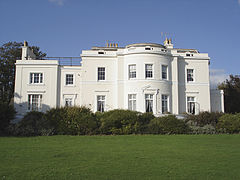Beach House, Worthing
| Beach House, Worthing | |
|---|---|

A view of the rear of Beach House, taken from Beach House grounds
|
|
| General information | |
| Architectural style | Regency |
| Town or city | Worthing, West Sussex |
| Country | England |
| Completed | 1820 |
| Client | Robert Carey Elwes |
| Design and construction | |
| Architect | John Rebecca |
Beach House in Worthing, England is a Regency beach-side villa, built in 1820 to designs by John Rebecca. It was originally known as Marino Mansion.
In the mid-nineteenth century, Sir Frederick Adair Roe, Chief Magistrate of the Bow Street office and head of the Bow Street Runners, London's police force, owned and lived in Beach House.
Sir Robert Loder, Conservative Member of Parliament for New Shoreham, lived at Beach House until his death in 1888. His wife, Lady Maria Georgiana Loder and his eldest son Sir Edmund Loder continued to live at Beach House after Sir Robert's death.
Between 1907 and 1910 King Edward VII stayed at the house several times while visiting Sir Edmund Loder and his family.
In 1917, playwright Edward Knoblock bought the house. His visitors included Arnold Bennett, J. B. Priestley, and Sir Compton Mackenzie. Knoblock refurbished the interior and forecourt of the property to the designs of Scottish architect Ormrod Maxwell Ayrton, while displaying furniture from the Thomas Hope collection he had bought from a sale at Deepdene in Dorking, Surrey.
...
Wikipedia
